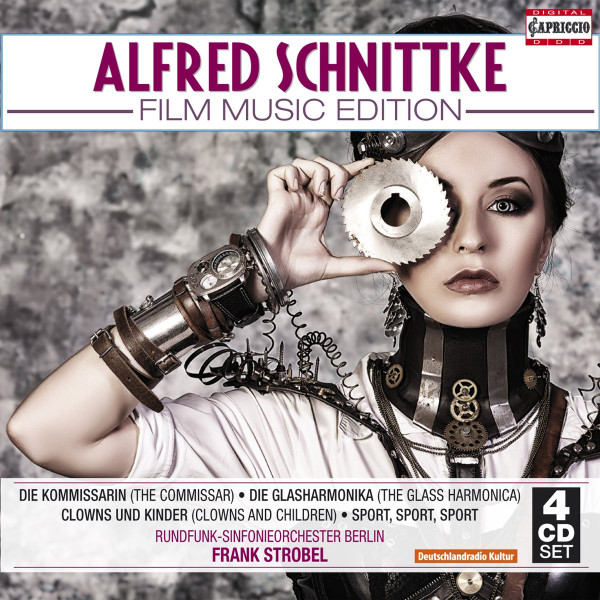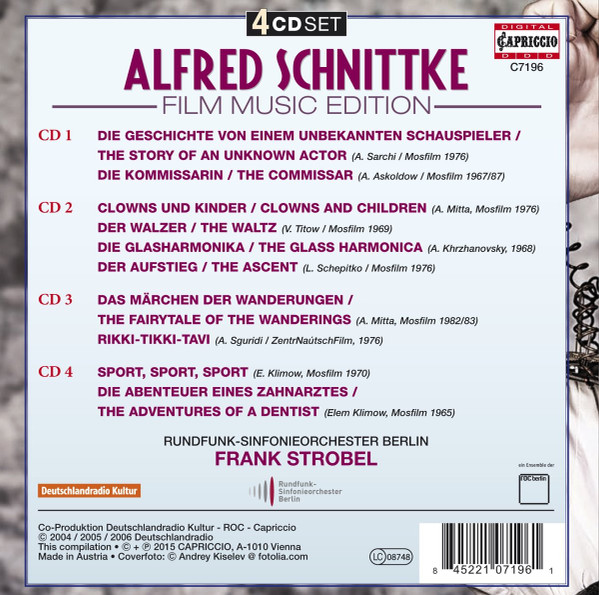Alfred Schnittke, RundfunkSinfonieorchester Berlin, Frank Strobel - Film Music Edition
Album: Film Music Edition
Rating: 5.0
Table of Contents
Download
Filename: alfred-schnittke-rundfunksinfonieorchester-berlin-frank.rar- MP3 size: 518.3 mb
- FLAC size: 2657.2 mb
Tracks
| Track | Duration | Preview |
|---|---|---|
| 7. Walzer / Waltz (Moderato) | 2:03 | |
| 5. Kampf / Fight | 4:50 | |
| Rikki-Tikki-Tavi | ||
| 6. Frühling / Spring | 2:55 | |
| 7. Keller / Cellar | 6:15 | |
| 3. Reue / Remorse | 2:45 | |
| 2. Hochzeit / Wedding | 1:37 | |
| Finale | 3:15 | |
| 1. Der Musiker Und Das Carillon / The Musician And The Carillon | 1:49 | |
| Liebeserklarung - Orlandos Thema / Pledge of Love - Orlando's Theme | 5:22 | |
| 2. Bedrohung Und Rettung / Menace And Rescue | 6:59 | |
| 8. Verzweiflung / Despair (Andante) | 2:25 | |
| 4. Walzer (Abschied) / Waltz (Farewell) | 3:23 | |
| Die Kommissarin / The Commissar | ||
| 11. Einsicht / Conclusion | 2:51 | |
| 4. Legende / Legend | 0:58 | |
| Clowns Und Kinder / Clowns And Children | ||
| 6. Epilog / Epilogue | 3:12 | |
| 10. Wanderung Der Verdammten / Trek Of The Damned | 4:28 | |
| 2. Absturz Der Kutsche – Das Meer / Crash Of The Carriage | 5:30 | |
| Menuett / Minuet | 2:05 | |
| 1. Die Baustelle / The Building Site | 3:43 | |
| 6. Liebe / Love | 3:30 | |
| 2. Prozession / Procession | 1:22 | |
| 3. Attacke / Attack | 3:21 | |
| 3. Fabrik / Factory | 3:27 | |
| 3. Der Park / The Park (Tempo Di Valse) | 2:12 | |
| Katz-und Maus-Spiel / Cat And Mouse Game | 2:46 | |
| 4. Pantomime (Allegretto) | 3:47 | |
| 3. Nacht / Night | 4:29 | |
| 1. Titelmusik - Interview / Title Music - Interview | 1:41 | |
| 1. Maschas Lied / Mascha's Song (Tempo Di Valse) | 3:17 | |
| 2. Gloria (Maestoso) | 3:20 | |
| 5. Thema Und Marsch / Theme And March | 2:26 | |
| 3. Akrobaten / Acrobats | 1:19 | |
| 6. Epilog – Finale | 2:08 | |
| 5. Charleston | 1:57 | |
| 2. Intermezzo | 1:38 | |
| 4. Spiel / Game | 4:12 | |
| 1. Spaziergänge D. Wawilowa Durch Die Stadt / Wawilowa's City Walk | 4:24 | |
| 5. Einzug In Die Stadt / Entering The City | 2:43 | |
| Pest / Plague | 5:54 | |
| 3. Die Geschichte - Die Flüge - Pyramide / Faces - Flights - Pyramids | 13:26 | |
| 8. Regen / Rain | 7:40 | |
| Die Abenteuer Eines Zahnarztes / The Adventures Of A Dentist | ||
| 2. Agitato I – Schlitten / Sledge | 3:15 | |
| 4. Das Lied Des Kaufmanns Kalaschnikow / Merchant Kalaschnikow's Song (Allegro) | 5:18 | |
| Der Waltzer / The Waltz | ||
| Der Aufstieg / The Ascent | ||
| Die Glasharmonika / The Glass Harmonica | ||
| 3. Agitato II – Reise / Trip | 4:42 | |
| 4. Wowka / Vovka | 1:30 | |
| 2. Griechenland - Das Bad / Greece - The Bath (Adagio - Presto) | 6:27 | |
| 2. Auf Dem Schlitten / On The Sled | 4:32 | |
| Das Märchen Der Wanderungen / The Fairytale Of The Wanderings | ||
| Zerstörung Des Schlosses / Destruction Of The Castle | 2:32 | |
| 4. Der Musiker - Das Erwachen / The Musician - The Awakening | 4:14 | |
| 9. Finale | 3:41 | |
| 6. Der Moderne Sport: Training - Sieger - Finale / Modern Sports: Training - Winner - Finale (Allegro Molto - Andante) | 5:36 | |
| 4. Im Krankenhaus / In The Hospital | 2:35 | |
| 3. Zukunft / Future (Menuett) | 1:40 | |
| Die Geschichte Eines Unbekannten Schauspielers / The Story Of An Unknown Actor | ||
| Sport, Sport, Sport | ||
| 5. Schlachtenbummler / Away Fans (Menuett - Fuge - Allegro) | 4:48 | |
| 1. Titelmusik / Title Music | 1:40 | |
| Tanz - Walzer - Orlandos Tod / Dance - Waltz - Orlando's Death | 4:47 | |
| 1. Thema – Titelmusik / Title Music | 2:44 | |
| Maitanz - Spelunke - Jagd / Mayday Dance - Dive Bar - Hunt | 8:05 | |
| 1. In Der Fledermaushöhle / In The Bat Cave | 4:47 | |
| 1. Sotnokows Tod / Sotnikov's Death | 6:55 | |
| 2. Kutsche / Carriage | 2:36 | |
| 5. Walzer / Waltz | 1:51 | |
| 9. Traum / Dream | 6:25 |
Images


Catalog Numbers
C7196Labels
CapriccioListen online
- online luisteren
- écouter en ligne
- kuunnella verkossa
- ouvir online
- online anhören
- lyssna på nätet
- ascolta in linea
- escuchar en línea
- lytte på nettet
Formats
- 4 × CD
- Reissue
Companies
| Role | Company |
|---|---|
| Published By | Internationale Musikverlage Hans Sikorski |
Credits
| Role | Credit |
|---|---|
| Conductor | Frank Strobel |
| Liner Notes | Frank Strobel |
| Engineer | Geert Puhlmann, Henri Thaon, Thomas Monnerjahn |
| Executive Producer | Wolfram Nehls |
| Editor | Wolfram Nehls |
| Recording Supervisor | Wolfram Nehls |
| Producer | Johannes Kernmayer, Stefan Lang |
Barcodes
Barcode: 8 45221 07196 1About Alfred Schnittke, RundfunkSinfonieorchester Berlin, Frank Strobel
Alfred Schnittke (1934-1998) was born on 24 November 1934 in Engels, on the Volga River, in the Soviet Union. His father was born in Frankfurt to a Jewish family of Russian origin who had moved to the USSR in 1926, and his mother was a Volga-German born in Russia. Schnittke began his musical education in 1946 in Vienna where his father, a journalist and translator, had been posted. In 1948 the family moved to Moscow, where Schnittke studied piano and received a diploma in choral conducting. From 1953 to 1958 he studied counterpoint and composition with Yevgeny Golubev and instrumentation with Nikolai Rakov at the Moscow Conservatory. Schnittke completed the postgraduate course in composition there in 1961 and joined the Union of Composers the same year. He was particularly encouraged by Phillip Herschkowitz, a Webern disciple, who resided in the Soviet capital. In 1962, Schnittke was appointed instructor in instrumentation at the Moscow Conservatory, a post which he held until 1972. Thereafter he supported himself chiefly as a composer of film scores; by 1984 he had scored more than 60 films. Noted, above all, for his hallmark "polystylistic" idiom, Schnittke has written in a wide range of genres and styles. His
Concerto Grosso No. 1
(1977) was one of the first works to bring his name to prominence. It was popularized by Gidon Kremer, a tireless proponent of his music. Many of Schnittke's works have been inspired by Kremer and other prominent performers, including Yury Bashmet, Natalia Gutman, Gennady Rozhdestvensky and Mstislav Rostropovich. Schnittke first came to America in 1988 for the "Making Music Together" Festival in Boston and the American premiere of
Symphony No. 1
by the Boston Symphony Orchestra. He came again in 1991 when Carnegie Hall commissioned
Concerto Grosso No. 5
for the Cleveland Orchestra as part of its Centennial Festival, and again in 1994 for the world premiere of his
Symphony No. 7
by the New York Philharmonic and the American premiere of his
Symphony No. 6
by the National Symphony. Schnittke composed 9 symphonies, 6 concerti grossi, 4 violin concertos, 2 cello concertos, concertos for piano and a triple concerto for violin, viola and cello, as well as 4 string quartets and much other chamber music, ballet scores, choral and vocal works. His first opera,
Life with an Idiot
, was premiered in Amsterdam (April 1992). His two new operas,
Gesualdo
and
Historia von D. Johann Fausten
were unveiled in Vienna (May 1995) and Hamburg (June 1995) respectively. From the 1980s, Schnittke's music gained increasing exposure and international acclaim. Schnittke has been the recipient of numerous awards and honors, including Austrian State Prize in 1991, Japan's Imperial Prize in 1992, and, most recently the Slava-Gloria-Prize in Moscow in June 1998; his music has been celebrated with retrospectives and major festivals worldwide. More than 50 compact discs devoted exclusively to his music have been released in the last ten years. In 1985, Schnittke suffered the first of a series of serious strokes. Despite his physical frailty, however, Schnittke suffered no loss of creative imagination, individuality or productivity. Beginning in 1990, Schnittke resided in Hamburg, maintaining dual German-Russian citizenship. He died, after suffering another stroke, on 3 August 1998 in Hamburg. He was married to pianist .
Real Name
- Alfred Garyevich Schnittke (Russian: Альфред Гарриевич Шнитке)
Name Vars
- A. Schnittke
- A. Shnitke
- A. Šnitke
- A.Schnittke
- A.Шнитке
- Alfred Garrievitch Schnittke
- Alfred Schnitke
- Alfred Šnitke
- Schnitke
- Schnittke
- А. Шнитке
- А.Шнитке
- Альфред Шнитке
- Альфред Шнітке
- Шнитке
